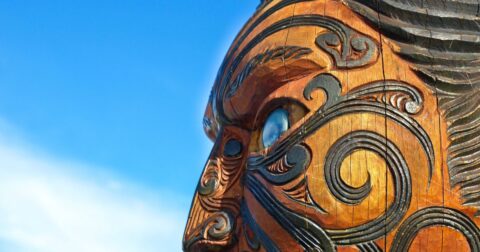Feature
Regenerative Agriculture Falls Short As a Climate Fix, New Study Finds
Research•5 min read
Perspective
Grass-roots activists and larger Māori organizations are working to introduce and restore "te ao Māori" at a national government level.


Words by Aaron Simon
Some 700 years ago when the Māori people discovered Aotearoa — what the Dutch came to call New Zealand — we became tangata whenua or ‘Indigenous to the land’ and we developed a series of systems that defined our relationship to the world. Te ao Māori or ‘the Māori worldview’ provided the context, rules and obligations for how to navigate our existence in ways that benefited all beings and all things. Te ao Māori uses concepts such as Kaitiakitanga, Mauri, Tapu, Whakapapa, Whanaungatanga (and many, many more) as the foundation of tikanga which translates roughly to “the right way.”
Yet over time, colonizers stripped Aotearoa of its natural resources and exploited its animals. Through legislation, colonial education and violent occupation, Māori people were distanced from tikanga that we used to maintain and protect the balance we had with our world.
Grass-roots activists and larger Māori organizations are working to introduce and restore te ao Māori at a national government level. By using the central concepts of Kaitiakitanga and Mauri as one of our primary lenses through which to view our relationship with and impact on the world, this movement aims to restore this balance.
Kaitiakitanga can be loosely translated to “guardianship.” The basic methodology of Kaitiakitanga is to act in a way that protects and enhances the mauri or the “life essence” present in all things.
This may sound simple but it requires us to first deeply examine our relationship with the natural world, including our relationship with the animals. Specifically, Kaitiakitanga requires us to view the environment, Atua — gods, humans and animals — as a community and as partners. If we don’t preserve this partnership, the community — including us — will not survive.
Kaitiakitanga is often used in Aotearoa as a loose synonym for environmental conservation but this definition is not entirely correct. Kaitiakitanga are empowered by whakapapa (our lineage) to act and have an obligation to actively preserve mauri in all things.
This might sound like an enormous responsibility but it’s not something that we alone carry. Everything and everyone in the community has whakapapa, and are therefore also empowered with the mana (power) required to act as a force for good.
There has been a multitude of changes since Europeans first arrived — colonizers introduced large grazing animals and other species of farmed animals, hunted native birds for export, farmers deforested large amounts of native ecosystems and extracted natural resources. The western approach to land, resource and environmental management has upset the balance of our delicate ecosystems.
The Environment Aotearoa 2019 report describes nearly 4000 native species as currently threatened or at risk of extinction by introduced species and diseases, pollution, physical changes to our landscapes and coast, hunting and harvesting – among many other factors.
Natively forested land in Aotearoa has also been reduced from 85 percent to between 10 and 15 percent coverage since human arrival according to The Department of Conservation. The main causes are logging, urban expansion mining, and deforestation for farmland for animal agriculture.
Animal agriculture, with its introduction of large land mammals to Aotearoa, required the removal of native forest and draining of wetlands for the growth of exotic grasslands. The consequence of farming these animals and the modification of the ecosystem has been largely detrimental to the land, waters, atmosphere and indigenous flora and fauna of Aotearoa. The introduction of smaller mammals such as rats, stoats, possums and hedgehogs as “pest-control” has led to significant sea and land bird population loss, causing an upset in the natural nutrient cycle, and has impacted the growth and distribution of native vegetation which relied on the bird populations for seed dispersal.
One particularly powerful way to restore mauri — or life essence — in a cooperative way is to opt out of animal agricultural systems, and to embrace a position of non-violence towards animals. The crucial network that animals form with the community to actively repair, recycle, transport and protect aspects of the natural world is without substitute. Their well-being is essential to caring for the environment in a way that is spiritually and ecologically sound.
The concept of Kaitiakitanga can transform our traditional western perspective of environmental guardianship. Its core principles are simply recognizing our relationship with the world — prioritizing actions that benefit the preservation and enhancement of mauri in the community. The effects of the loss of mauri are observable and multifaceted, and we must thoroughly examine our relationship with the world – including our fellow animals – if we wish to become kaitiaki once more.
Sentient Media’s Indigenous Voices for Saving Animals and Earth is a collection of essays illuminating important perspectives from Indigenous peoples, including traditional knowledge from the past and proposed solutions for the future. Edited by Jessica Scott-Reid, this project tackles land and water sovereignty, factory farming, food systems, veganism, colonialism, reconciliation and more, through a variety of Indigenous lenses.